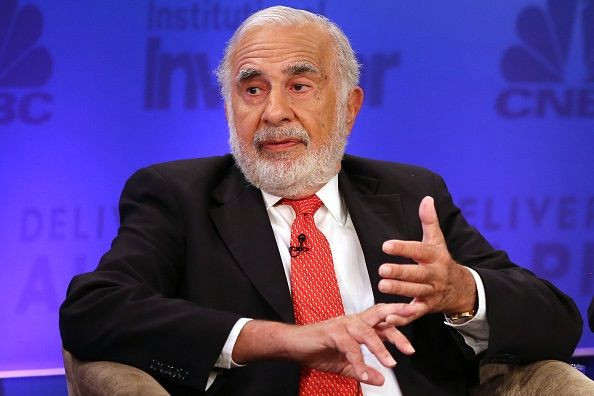Dow Jones Industrial Average Plunges After Investor Carl Icahn Says He Sold His Entire Apple Inc. (AAPL) Stake

This story was updated at 4:05 p.m. EDT.
U.S. stocks fell steeply Thursday afternoon after billionaire activist investor Carl Icahn said he had sold his entire stake in Apple, citing the risk of China's influence on the stock.
Icahn, in an interview with cable channel CNBC, also said he is "still very cautious" on the U.S. stock market and there will be a "day of reckoning" unless there was some sort of fiscal stimulus. Icahn had been a huge fan of Apple, repeatedly calling the investment a "no-brainer."
Apple was the worst-performing stock in the Dow Jones Industrial Average Thursday, closing the day down 3 percent at $95.
The Dow finished the day with a loss of 211 points, or 1.2 percent, at 17,831, while the Standard & Poor’s 500 index was down 19 points, or 0.9 percent, at 2,076, and the tech-laden Nasdaq composite index slumped 58 points, or 1.2 percent, to 4,805.
Earlier, stocks slid after the Bank of Japan stunned markets by choosing not to expand monetary stimulus, showing yet again how vulnerable markets are to central bank decisions.
The Bank of Japan’s decision to hold steady in the face of soft global demand and a rise in the yen was particularly jarring for markets after media reports that the central bank wanted to go deeper into negative interest rates.
The BoJ’s announcement came a day after the U.S. Federal Reserve chose to hold steady on its interest rates and the easing of fears that the Fed would signal a rise in June.
While the American labor market continues to gain strength, inflation remains below the U.S. central bank’s 2 percent target.
“We would not expect the Bank of Japan’s decision to have a sustainable, lasting impact on the U.S., but we do think that it is yet another illustration of the power that central banks have upon the markets,” said Erik Wytenus, global investment specialist at J.P. Morgan Private Bank, in Palm Beach, Florida. “It has been over half a decade now where central banks are really the most important factor in capital markets.”
Earlier, Asian stocks surrendered early gains in chaotic trading and the yen surged against the dollar after the Bank of Japan defied market expectations for more monetary stimulus even as prices slipped deeper into deflationary territory.
A near 3 percent fall in the dollar-yen ratio was its biggest daily drop since August 2015 and the second biggest in five years, while the yen's gain against the euro was the biggest in five years. European shares also struggled.
In U.S. deal news, Comcast, the owner of NBCUniversal, said Thursday it would buy DreamWorks Animation SKG for $3.8 billion in cash. The $41-per-share offer represents a premium of 27.3 percent over DreamWorks’ closing share price Wednesday.
Meanwhile, data Thursday showed that U.S. economic growth in the first quarter of the year braked sharply to its slowest pace in two years as consumer spending softened. Gross domestic product increased at 0.5 percent, below the 0.7 percent rise expected by economists polled by Reuters.
Another piece of data showed the number of Americans filing for unemployment benefits rose to 257,000 last week from 247,000 the previous week, but the underlying trend remained consistent with tightening labor market conditions.
First-quarter corporate earnings are expected to fall 6.9 percent, according to Thomson Reuters I/B/E/S.
Facebook bucked the market trend as its shares jumped 8 percent to $117 a day after the company reported its revenue soared 50 percent.
Domino’s Pizza fell 10 percent to $120 after its results missed estimates, while Ford Motor rose 3 percent to $14 after reporting a 113 percent surge in quarterly profit.
St. Jude Medical soared 26 percent to $78 after Abbott Laboratories said it agreed to buy the medical device maker for $25 billion. Abbott sank 8 percent to $40.
Data from Reuters were used to report this story.
© Copyright IBTimes 2024. All rights reserved.




















